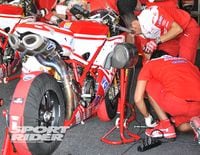Twin-cylinder motorcycles competing in the World Superbike Championship (which basically means the six Ducatis in the field at this point) have been given a further 3kg minimum weight reduction after race officials reviewed race results from the Miller Motorsports Park, Misano, and the recent Brno round and found the “average value of the event averages over the last three events… favors the 1000cc 4-cylinder motorcycles by more than 5 points.” Thus both four-cylinder and twin-cylinder motorcycles now have identical minimum weight requirements of 162kg (357 pounds). The twins were originally given a 3kg weight break before the Miller round after a similar finishing average favored the four-cylinder machines in previous events.
It should be noted though, that had Carlos Checa’s private Ducati not failed him in both races at Miller Motorsports Park while he was surely on his way to a double victory weekend, the numbers would have been significantly different. Also, the Ducati Xerox team and other satellite/privateer Ducati teams feel that weight breaks aren’t going to help them, as it’s on top-end speed where they’re being left behind by the fours, not off the corners (where weight can help with acceleration). Most of the teams feel that the current 50mm restrictor plates are too much of a hindrance, and should be opened up a bit to equalize performance.
The twin-cylinder machines were originally given the weight disadvantage and required fitment of 50mm intake restrictors prior to the ’08 season after vociferous protests by the four-cylinder teams when the FIM and InFront decided to allow 1200cc V-twins (Ducati wanted to race its just-released 1098R model—actually 1198cc in displacement—saying that maintenance costs were too high in order to keep racing the old 999 model) to compete in the championship. The original minimum weight and air restrictor rule managed to head off what was increasingly looking like an ugly confrontation that could have resulted in many four-cylinder manufacturers dropping out of the WSBK series.

/cloudfront-us-east-1.images.arcpublishing.com/octane/OZV6E2KNIJDVHGOKXQQ2AHKLHQ.jpg)
/cloudfront-us-east-1.images.arcpublishing.com/octane/XSKMIBFZIZDN7JC6P7SMNMD3QA.jpg)
/cloudfront-us-east-1.images.arcpublishing.com/octane/ITVHWHVQ75BQBHACERYDJLPLHE.jpg)
/cloudfront-us-east-1.images.arcpublishing.com/octane/M3QRBSQ4VFEVPKYTTM3OETVFBU.jpg)
/cloudfront-us-east-1.images.arcpublishing.com/octane/H3EMT5NJ5BDZPBBH27SW3ADQH4.jpg)
/cloudfront-us-east-1.images.arcpublishing.com/octane/XTROSHDZFJB5DIJYU2VF2REFIU.jpg)
/cloudfront-us-east-1.images.arcpublishing.com/octane/7EUSM4GQEBEFTPAYZ6MOMKMMUQ.jpg)
/cloudfront-us-east-1.images.arcpublishing.com/octane/ZN44KZLHD5CHVIY3WZYAGTPGSI.jpg)
/cloudfront-us-east-1.images.arcpublishing.com/octane/5A776WXBY5GAPDYFTTUEUZNIJA.jpg)
/cloudfront-us-east-1.images.arcpublishing.com/octane/NCYHFQ2S3BAT7EC7VDN2ONGRTU.jpg)
/cloudfront-us-east-1.images.arcpublishing.com/octane/XQORS527YFFT3MVI326EOEYJUI.jpg)
/cloudfront-us-east-1.images.arcpublishing.com/octane/TVDPP3TGMZHODFXASIFUM2KD34.jpg)
/cloudfront-us-east-1.images.arcpublishing.com/octane/EWDMR3DDTBBQPI7DQVZCLMRFAE.jpg)
/cloudfront-us-east-1.images.arcpublishing.com/octane/4XHHLVOUKFE3PDSWNSV4JJMGOE.jpg)
/cloudfront-us-east-1.images.arcpublishing.com/octane/5RLI3NQKQJA3LKKCQHRXQFTL6Q.jpg)
/cloudfront-us-east-1.images.arcpublishing.com/octane/3QCYJCI2RNBENIRWAKEOEKHFUM.jpg)
/cloudfront-us-east-1.images.arcpublishing.com/octane/XJFFFMRN6VEZ7CDNAGKWVPC3H4.jpg)
/cloudfront-us-east-1.images.arcpublishing.com/octane/RMC3CHWSHFAUJA2WJ2FVG4NBOA.jpg)
/cloudfront-us-east-1.images.arcpublishing.com/octane/WXEZV4WAYBERFKSRE5M7GQBW7A.jpg)
/cloudfront-us-east-1.images.arcpublishing.com/octane/LO3PZVGICFGJZBNUA2ORUSAUSE.jpg)
/cloudfront-us-east-1.images.arcpublishing.com/octane/UFHLTNOXLVARVLZV32M6ZJZV4Y.jpg)
/cloudfront-us-east-1.images.arcpublishing.com/octane/CTSWNU7SNNCC3LWB2KATYZ5AXY.jpg)
/cloudfront-us-east-1.images.arcpublishing.com/octane/72EPJVNA2VGVXJ2BVDFFLN67KQ.jpg)
/cloudfront-us-east-1.images.arcpublishing.com/octane/A7C4GNXEHNHC3LL6RETG6MIPPY.jpg)